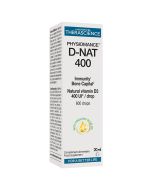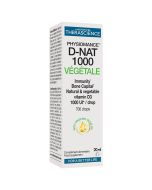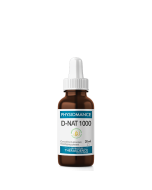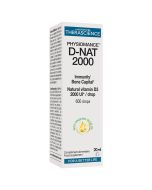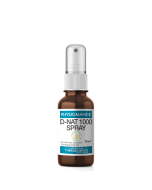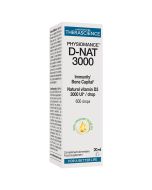PHYSIOMANCE® D-NAT 3000 provides 3,000 IU* (75 μg) of natural vitamin D3 per drop (33 µl) or per capsule, in a natural and bioavailable form.
Vitamin D is essential for the proper activity of the cells of the immune system. Essential for bone health, necessary for bone growth, mineralisation and development, it acts on the absorption of calcium and phosphorus. Vitamin D is involved in muscle function and also plays an important role in cell division.
*IU: International Units
Why choose PHYSIOMANCE® D-NAT 3000 from the THERASCIENCE Laboratory ?
For its formula containing vitamin D from a 100% natural source, in oily form for better absorption, but also for its optimal dosage when needs are increased.
Expert opinion
Die Académie Nationale de Médecine empfiehlt eine tägliche Zufuhr von mindestens 800 Internationalen Einheiten (IE) Vitamin D.
Der Bedarf an Vitamin D ist besonders bei Frauen in den Wechseljahren und allgemein bei Personen über 50 Jahren erhöht da mit zunehmendem Alter die Fähigkeit der Haut, Vitamin D zu produzieren, abnimmt und die Ernährung oft nicht ausreicht, um den Bedarf zu decken. Zudem steigt das Risiko für Infektionen und Knochenbrüche durch Stürze im Alter.
Es ist jedoch wichtig, die empfohlene Tagesdosis nicht zu überschreiten, da eine zu hohe Vitamin D-Zufuhr gesundheitsschädlich sein kann. Die Deutsche Gesellschaft für Ernährung (DGE) empfiehlt für Erwachsene eine tägliche Zufuhr von 800 IE Vitamin D.
Eine ausgewogene Ernährung, die Vitamin D-reiche Lebensmittel wie fettreichen Fisch, Eier und angereicherte Produkte umfasst, sowie eine angemessene Sonnenexposition können dazu beitragen, den Vitamin D-Bedarf zu decken. In einigen Fällen kann eine Supplementierung sinnvoll sein, sollte jedoch unter ärztlicher Aufsicht erfolgen.
Did you know it ?
The National Academy of Medicine recommends at least 800 IU*/d of vitamin D1.
The need for vitamin D is greater for women at menopause and, more generally, for everyone from the age of 50 onwards, when the loss of bone density accelerates and the body's defences become more fragile. In fact, the skin's ability to produce vitamin D decreases with age and the diet is not sufficient to cover the body's needs. Moreover, the risk of infection and the risk of fracture due to falls increase significantly with age.
*IU: International Units
1. Vitamin status, extra bony role and daily vitamin D requirements. Bull. Acad Nat Med, 2012.















